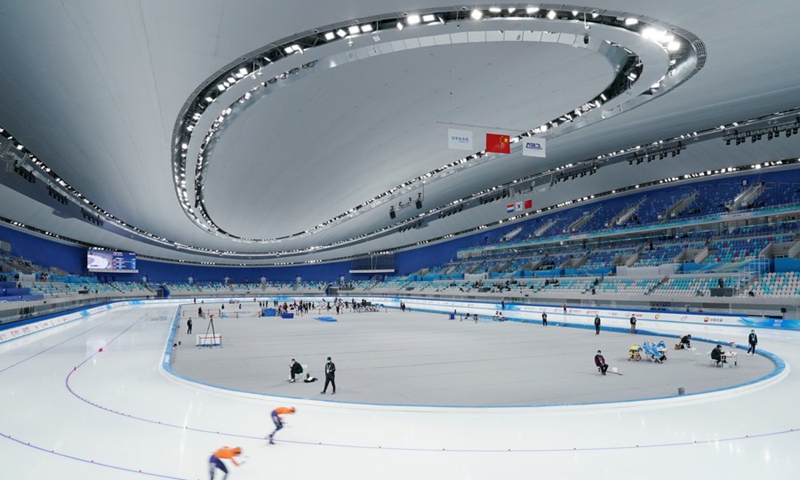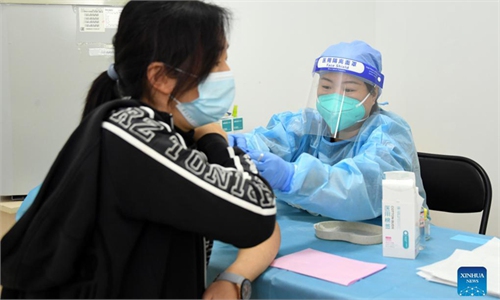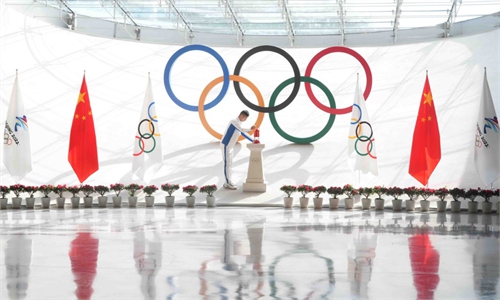
Athletes compete during the women's 1500m final at the Speed Skating China Open in Beijing, China, on Oct. 10, 2021. (Photo: Xinhua)
More than 360 foreign athletes and delegation staff members have descended on Beijing's Capital Indoor Stadium, where they will participate in the World Cup Short Track Speed Skating from Thursday to Sunday. It's the qualification match for the 2022 Beijing Winter Olympic Games.
The event will also serve as a rare opportunity for China's capital to rehearse closed-loop and bubble management against the backdrop of the latest COVID-19 sporadic cases. According to the organizers, the qualifying match is being held with Olympic-level epidemic prevention measures, with a little over 100 days to go to the Winter Games' opening in February 2022.
"It's an official rehearsal for the 2022 Beijing Winter Games, which will be broadcast to the world," Zhang Yanxiang, the head of the sports authority of Beijing's Haidian district, told the media on Wednesday.
Consistent with the Winter Olympics, the Short Track Speed Skating competition has a total of nine events. A total of 232 athletes from 37 countries and regions have signed up to participate, including 102 women and 130 men.
Li Jintao, the director of the center for epidemic prevention and control of Haidian district, told the media that game-related personnel will be transported with chartered vehicles from spot to spot, to ensure isolation from the public. Materials and garbage are also being strictly managed under the closed-loop system.
In September, the Beijing 2022 Organizing Committee announced that all athletes for the 2022 Winter Games who are fully vaccinated will enter a closed-loop management system upon arrival in Beijing. Games participants who are not fully vaccinated will have to serve a 21-day quarantine upon arrival in Beijing.
For this competition, Global Times learned from the organizers that foreign athletes will not be subject to the "14+7" quarantine, but will be required to provide a negative nucleic acid test certificate within 72 hours. They will have to leave immediately after events, using designated buses to reach the airport.
For arrival and departure receptions, reporters have learned that a closed-off route of "airport-hotels-stadium" is being adopted, with designated passage channels and pick-up and guiding staff to assist overseas delegations.
Organizers said on Wednesday that during the World Cup match, the arrival and departure service support team plans to dispatch more than 400 bus services a day with 24-hour operations. The vehicles have fixed lines, drop-off points are also designated, and the vehicles have designated gas stations. Bus drivers will undergo a daily nucleic acid test.
In addition, nucleic acid testing for the event will cover all people, objects and the environment. Technology such as smart temperature monitoring and contactless exchange will also ensure that the hosting of the event is low risk, media reports said.
The three-month test matches for the Beijing 2022 Winter Olympics and Paralympics began on October 5. Eight venues of the Winter Olympics in the Beijing urban area, Yanqing district and Zhangjiakou of Hebei Province are expected to host 10 international matches, three international training weeks and two domestic testing activities, organizers said.
The Capital Indoor Stadium in Haidian district just finished its first test event for figure skating on October 16, passing the first test in epidemic prevention and sports event management. Latvian figure skater Deniss Vasiļjevs was impressed by Beijing's preparations,telling media that he had never seen a place where quarantine protocols were so well enforced.
Ru Xiuying, a professor with the Capital University of Physical Education and Sports, told the Global Times on Thursday that hosting such a test event is not only a test of athletes and stadium facilities, but also a comprehensive test and rehearsal of the city's manpower and services.
"The strict anti-epidemic measures for the event match China's consistent attitude toward the virus, and the safety of China's 1.4 billion people is based on this experience," Ru said.



